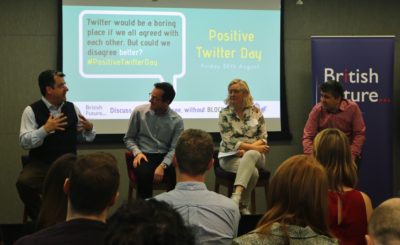We were at Twitter’s London HQ today, writes Josh Westerling, for our #PositiveTwitterDay panel event, asking: ‘How can we disagree better?’.
To discuss this question, we welcomed Paul Staines of the Guido Fawkes political site (@GuidoFawkes) and Ros Wynne-Jones of The Daily Mirror (@RealBritainRos), alongside British Future’s Director Sunder Katwala (@sundersays).
Sunder first launched Positive Twitter Day in 2012 as a response to the coarsening of political discourse, with Guido Fawkes an early supporter. Even back then, he told us, with the country uniting around Team GB, “People said ‘I’m going to find it really hard actually’”.
Paul noted how the debate has now changed as social media has changed. Where Twitter used to be mainly journalists and politicians speaking in their own bubble, it is now mass-market, and with the voters present “It’s emotional and more aggressive because this debate is more real for them,” he said.
 That’s not always the case in the real world, Ros Wynne-Jones told us. Ros has been bringing people together, across the referendum divide, for face-to-face conversations as part of the Britain Talks initiative from the Mirror and Express newspapers. She reflected on how meeting face-to-face meant that “People realised they had so much in common once they got off the subject of Brexit…if we can do it offline, it’s got to be possible to do it online”.
That’s not always the case in the real world, Ros Wynne-Jones told us. Ros has been bringing people together, across the referendum divide, for face-to-face conversations as part of the Britain Talks initiative from the Mirror and Express newspapers. She reflected on how meeting face-to-face meant that “People realised they had so much in common once they got off the subject of Brexit…if we can do it offline, it’s got to be possible to do it online”.
How then can we disagree better online? Paul suggested that changing the culture of social media is the way forward: “If it becomes uncool to be offensive it could change,” he said. One way to achieve this, Sunder Katwala suggested, is to call out your own side, as well as your opponents, when they cross the line.
Of course, there are some users of Twitter – the Trolls – with whom it is hard to reason, no matter what your politics are. Our panel were torn on how to deal with this issue. Ros had concerns that by banning anonymous accounts you would be ending an effective form of social activism. Paul suggested that rather than banning anonymous accounts, Twitter could prevent them from replying to tweets, restricting their ability to target individuals on the platform.
Yet we cannot rely solely on action from Twitter in order to disagree better. As users, there is much we can do to promote civil online discourse. Sunder suggested an effective approach is to reply calmly and civilly to those you disagree with. People are often taken aback by civil interactions on social media, so “Getting that first interaction right can really help,” he said.
Indeed, this is supported by academic research, highlighted by chair Steve Ballinger, which shows that exposure to civil online discourse has a positive effect on social trust. Ros Wynne-Jones suggested that tweeters could simply “Wait five minutes before you reply. You may not even want to respond after you’ve paused and thought about it.”
In the spirit of the day our panel ended on a positive note. Sunder reminded the audience of the positives of being able to connect with others so easily – that “It’s slightly magical that we have devices in our pockets that enable us to communicate with people all over the world.” He underlined, too, that there isn’t a general climate of incivility in our culture: outside the school gates, for example, relations are pretty good.
The panel were invited to nominate someone who they disagree with, but also respect. Here Paul nominated Matt Zarb-Cousin (@mattzarb) , as “A really funny tweeter” – and his favourite Corbynista.
In that spirit, we ended our event with a call to the audience to show their support for #PositiveTwitterDay – by getting on the hashtag, debating politely with those with whom we disagree and generally playing nicely – at least for today.






